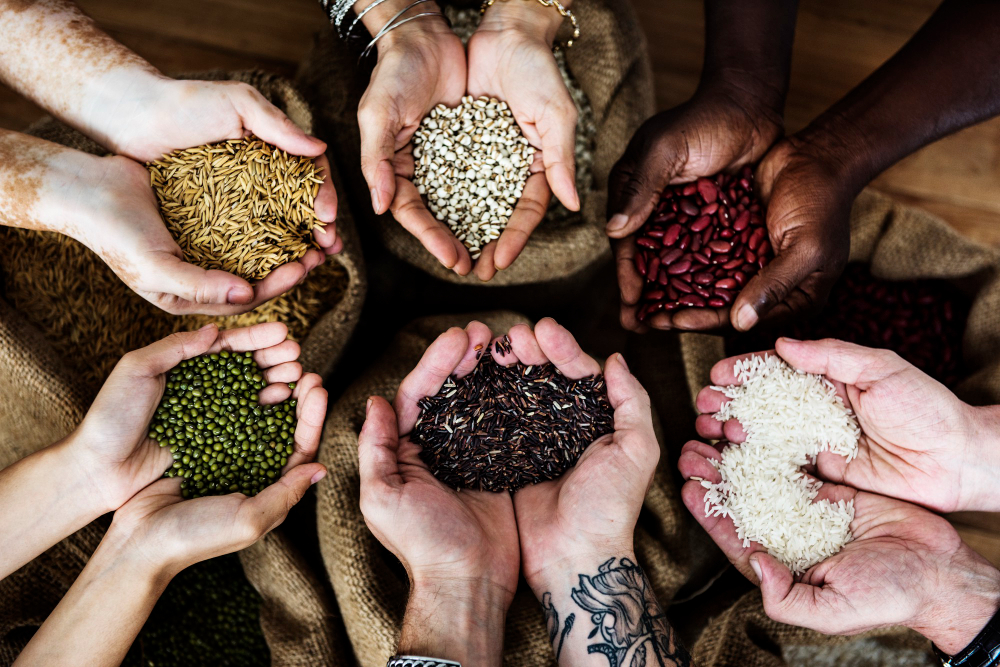Food and nutrition are the way that we get fuel, providing energy for our bodies. We need to replace nutrients in our bodies with a new supply every day. Water is an important component of nutrition. Fats, proteins, and carbohydrates are all required. Maintaining key vitamins and minerals are also important to maintaining good health, while for pregnant women and adults over 50, vitamins such as vitamin D and minerals such as calcium and iron are important to consider when choosing foods to eat, as well as possible dietary supplements.
A healthy diet includes a lot of natural foods. A sizeable portion of a healthy diet should consist of fruits and vegetables, especially ones that are red, orange, or dark green. Whole grains, such as whole wheat and brown rice, should also play a part in your diet. For adults, dairy products should be non-fat or low-fat. Protein can consist of lean meat and poultry, seafood, eggs, beans, legumes, and soy products such as tofu, as well as unsalted seeds and nuts.
Good nutrition also involves avoiding certain kinds of foods. Sodium is used heavily in processed foods and is dangerous for people with high blood pressure. The USDA advises adults to consume less than 300 milligrams (mg) per day of cholesterol (found in meat and full-fat dairy products among others). Fried food, solid fats, and trans fats found in margarine and processed foods can be harmful to heart health. Refined grains (white flour, white rice) and refined sugar (table sugar, high fructose corn syrup) are also bad for long-term health, especially in people with diabetes. Alcohol can be dangerous to health in amounts more than one serving per day for a woman and two per day for a man.
There are many high-quality, free guidelines available for healthy eating plans that give more details on portion size, total calorie consumption, what to eat more of, and what to eat less of to get healthy and stay healthy.

Nutritional Deficiencies
Even if you are getting enough to eat, if you are not eating a balanced diet, you may still be at risk for certain nutritional deficiencies. Also, you may have nutritional deficiencies due to certain health or life conditions, such as pregnancy, or certain medications you may be taking, such as high blood pressure medications.
One of the most common nutritional deficiencies is iron deficiency anemia. Your blood cells need iron in order to supply your body with oxygen, and if you don’t have enough iron, your blood will not function properly. Other nutritional deficiencies that can affect your blood cells include low levels of vitamin B12, folate, or vitamin C.
Vitamin D deficiency may affect the health of your bones, making it difficult for you to absorb and use calcium (another mineral that you may not be getting enough of). Although you can get vitamin D by going out in the sun, many people with concerns about skin cancer may end up with low levels of vitamin D by not getting enough sun.
Other nutritional deficiencies include: beriberi: low levels of vitamin B1 (found in cereal husks)
ariboflavinosis: low levels of vitamin B2. pellagra: low levels of vitamin B3
paraesthesia: low levels of vitamin B5 leading to a “pins and needles” feeling
biotin deficiency: low levels of vitamin B7, which can be common in pregnancy
hypocobalaminemia: low levels of B12
night blindness: low levels of Vitamin A
scurvy: low levels of vitamin C
rickets: severe vitamin D and/or calcium deficiency
vitamin K deficiency
magnesium deficiency: occurs with certain medications and medical problems
potassium deficiency: occurs with certain medications and medical problems
Eating a balanced diet can help prevent these conditions. Vitamin supplements may be necessary for certain people, such as pregnant or nursing mothers and people with intestinal conditions.

